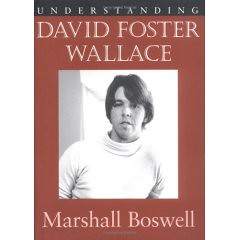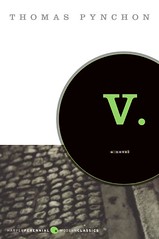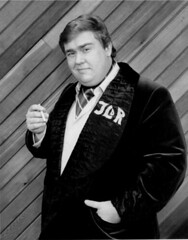 I was all ready to write my latest entry -- it involved dachshunds, hang gliding, and the Swedish bikini team -- when I chanced upon this article about the possible release of a new novel.
I was all ready to write my latest entry -- it involved dachshunds, hang gliding, and the Swedish bikini team -- when I chanced upon this article about the possible release of a new novel.
Out went the Swedish bikini team, in went Thomas Pynchon.
To say I was once obsessed with Pynchon is to put too a fine a point on it; but it is a fair assessment to say that I once called him my favorite author, though I didn't completely understand (nor could I explain) his books. There is something hypnotic about the man and his work, even though most all of we know about the man is through his work.
For it is not necessarily his writing that people know of Thomas Pynchon. If you have read all of "V." or "Mason & Dixon," you have little company. And if you've read his magnum opus, "Gravity's Rainbow," cover to cover, raise your hand. Ah, just as I thought. No stink in here, because nobody raised their hands and exposed their armpits.
If you know about Pynchon, it is because you know he is obsessive about his privacy. No pictures. No book tours. No interviews, blogs, or appearances at the National Book Awards.
His secretive existence has created a mystique about the man that undoubtedly outstrips the reality, which is that Pynchon is, by all accounts, simply a quiet and withdrawn dude, though he "appeared" on The Simpsons.
There have been many a thesis written on Pynchon that have less to do with his work than on his identity: he doesn't exist, he is an amalgam of several writers, he is really Anita Ekberg or Paris Hilton, etc.
If you need a book explaining you...
Which brings me back to the latest book. A blurb on Amazon.com reportedly is by the great man himself, describing his forthcoming work. Without going into detail, what I found interesting was less the description itself than the commentary from readers, at least one person in particular:
"Pynchon has engaged in hypertextual self-parody of the strangest order…"
"This is the new conspiracy, the conspiracy of identity (an attack on identity politics?)."
"My guess is viral-marketing or, more hopefully, a Swiftian self-parody and critique of Internet subcultures (a sort of new, updated Tale of a Tub.)"
Granted, the same fella wrote all three of these comments. But it reflects the conspiratorial nature of Pynchon's work and his obsessive fans' desire for, well, more Pynchon.
While the prospect of a Pynchon novel first excited me, it ultimately left me depressed, like the time a writing teacher first described a short story of mine as "promising" then compared it to an "effluent stream."
I first read "V." when I was in college, and the next 10 to 15 years I spent trying to crank out pale, pale imitations. If I didn't want to be Pynchon, I certainly wanted to be able to write like Pynchon. This turned out to be a grave mistake.
For Pynchon's strengths -- his dazzling erudition and brilliant sense of humor -- are also his weaknesses, and I was drawn to these things like sleaze to Atlantic City.
Pynchon's characters can be flat, and the emotional import of his work can border on constipated, but I never really cared because everything else was so brilliant, funny, and even moving. (The chapter "Mondaugen's story" in "V." and the short story "Entropy" are simply some of the best American fiction that's been written the last half century.)
And if Pynchon could get away with limited character development and emotional depth, why couldn't I?
So much of my early fiction is marked by wackiness and incoherent, pseudo-intellectual ramblings, just like Pychon, except without the wit or actual intelligence.
We all imitate our influences when we first pick up the pen, as we feel out what we know and search for that elusive voice. Sometimes, however, imitation can be dangerous.
Trying to write like Pynchon is like trying to make a movie out of "Gravity's Rainbow": you may think you are undertaking a noble endeavor, but futility is your reward. A mere mortal like myself just doesn't have any business trying to replicate or even imitate someone like Pynchon, no more than I have any business imitating Joyce, Virginia Woolf, or the late, not-so-great Mickey Spillane.
Pynchon traffics in conspiracies and dark secrets, plots translated on milk cartons, cabals embedded in Zip codes. This has great appeal to certain types like myself, who seek deeper meanings to explain the chaos of human existence; or, you could say, a lot of his readers are guys who grew up on comic books and science fiction. If you were to make "The Matrix" even more didactic, obscure, globe-trotting, and without Keanu Reeves, you'd have a Pynchon movie.
My path of destruction started here
Even if I were to get an IQ implant and could write like Pynchon, it doesn't mean that I would get a lot of fans -- Pynchon leaves a lot of readers cold. With their brainy, hyper-intellectual, erudite work, Richard Powers and David Foster Wallace are considered the natural heirs to Pynchon, but I can't seem to get into their work. Because at this age, it I probably want more than mere brilliance (though I been told to read "Galatea 2.0." Told several times.)
So when it's released, I'll buy Pynchon's latest, read it, not understand it, and flap my gums on its greatness. But I won't mimic it.
Please, God, stop me.
Thursday, July 20, 2006
Great Writer, Bad Influence
Subscribe to:
Comment Feed (RSS)


|